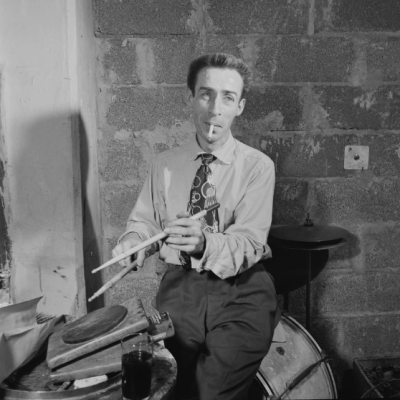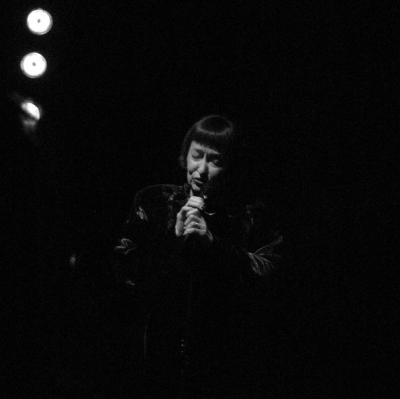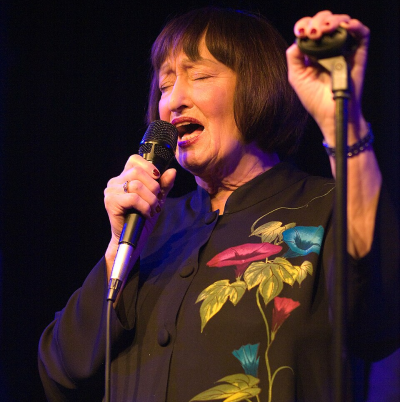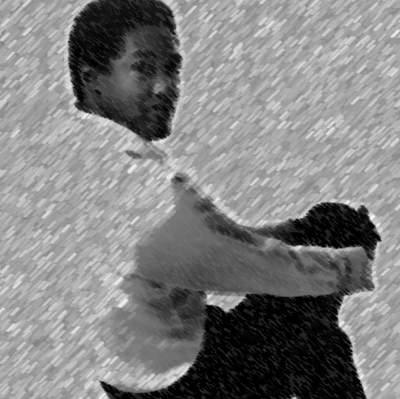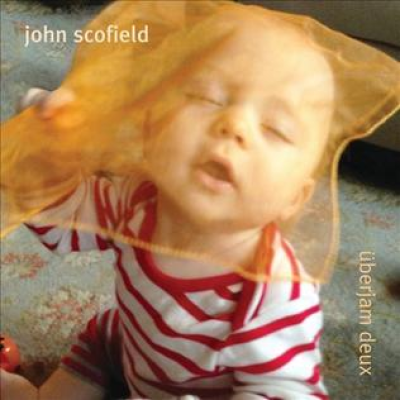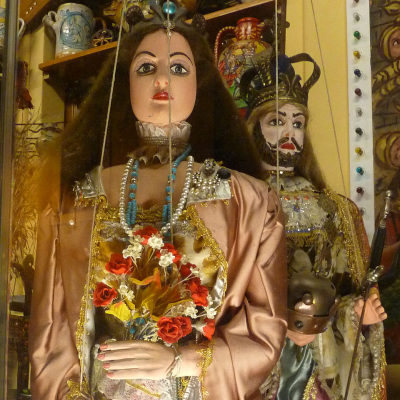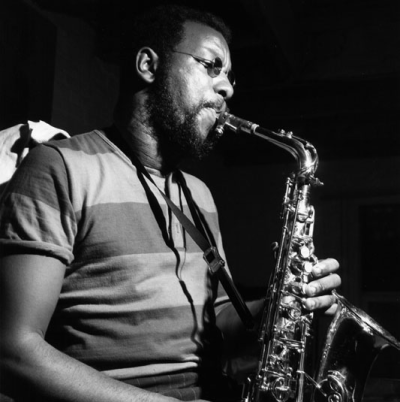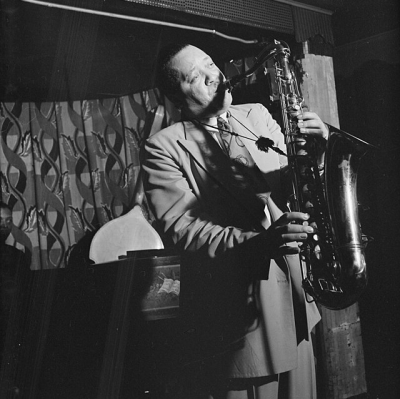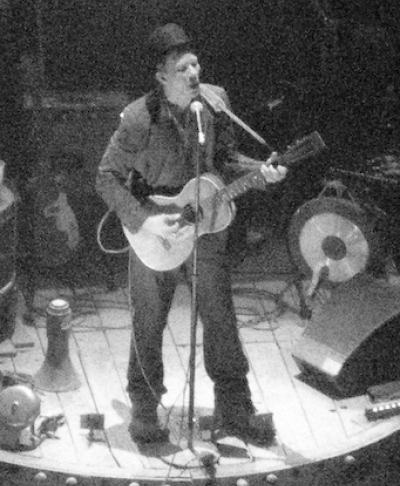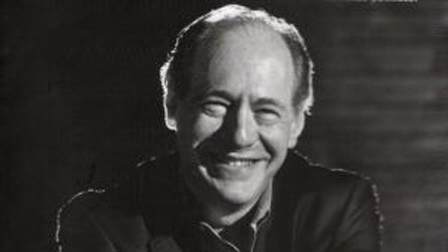
A Conversation with Gary Giddins
*
Village Voice writer Gary Giddins, winner of the National Book Critics Circle Award, and who is the country’s preeminent jazz critic, joins us in a June 21, 2002 conversation about Invisible Man author Ralph Ellison.
Conversation hosted by Jerry Jazz Musician publisher Joe Maita.
____________________
JJM In your 1983 essay “Fathers and Son,” you write, “If you are a critic, nothing is harder to criticize than the critics who influenced you most.” Was Ralph Ellison an influence on you?
GG Ellison influenced me as a novelist, and I think some of his best writing is in his essays like “An Extravagence of Laughter,” and I loved the essays he did on Charlie Christian and Jimmy Rushing. I don’t have a conscious sense of having been influenced by him as a jazz writer, per se. I think his impact on jazz criticism has been greatly overstated in the last couple of years. I think that in many ways he is typical of his generation, that he was a swing fan who wrote brilliantly about the music he loved and especially about figures that he knew and understood, like Christian and Rushing. But I think his piece on Charlie Parker is all too typical of the musical “moldy fig” attitude of the period, and I think that is even more obvious in the letters that were published between Ellison and Albert Murray, and in some of the other pieces. I venerate Ellison, make no mistake, and I think Invisible Man is one of the great American novels, and it would probably make my Top Ten list all time in American letters. The sections in it about jazz – especially Armstrong – are just superb, but I don’t really think of him as a jazz writer. The idea that he writes jazzy rhythms, I think, is just silly.
JJM What are your thoughts concerning Juneteenth?
GG Juneteenth, I thought, was just a huge mistake. The big Modern Library collection of essays was a great contribution that amplifies our understanding and justifies our growing admiration for Ellison. I think the same is true for the short stories collected as Flying Home. But to take an excerpt from a novel and publish it as a stand alone piece in an attempt to make it a kind of commercial sequel, in a sense, to Invisible Man, was hugely unfair to Ellison’s reputation. It should have been done in an academic way with academic footnotes, and it probably should not have been done at all until the entire manuscript had been edited and published in some way. I feel the same way about a lot of the posthumous Hemingway and a lot of the posthumous writing of Faulkner and others. In Ellison’s case, he left work that should have been treated more respectfully, and no attempt to find a trade novel in that huge morass of writing should have been made.
JJM The quality of the writing in his jazz essays was pretty spectacular. Was that quality used as a benchmark for other jazz writers?
GG Ellison’s prose at its best is just exquisite. The essay on Rushing has lines in that I can still remember, and I haven’t looked at that piece in probably twenty years. I think in part because it was Ellison, a great contemporary novelist writing about jazz, who brings a certain stature to jazz criticism that Martin Williams was never going to get from the establishment, yet who was a far superior critic. I don’t think that Ellison would ever have considered himself a critic. It seems preposterous to me. There is no evidence in any of his work that I can find, that he ever thought of himself as a critic. He was an essayist, and he made jazz one of his subjects, along with the literature. He wrote about Charlie Parker, he also wrote about Richard Wright, and he wrote about it beautifully, and those pieces should be honored for what they are. For me, if we are going to talk about my influences, two of the men written about in the essay that you had me quoting from are Martin Williams and Dan Morgenstern. Those, for me, were the primary influences and inspiration.
JJM Ellison’s work has been described as the literary equivalent of jazz
GG I don’t know what that means, I swear to God. I just don’t get that at all, and I think it is so unfair to Ellison to try to describe one art with another by using another art. Would anybody ever say that Sonny Rollins is the musical equivalent of literature?
JJM What writers would have influenced jazz musicians? You can make the case that Jack Kerouac was influenced by Lester Young and Charlie Parker, and he makes claim for that, but how do you turn that around?
GG Well, Duke Ellington was influenced by certain writers, but for the themes that they wrote about. Roi Ottley had a huge impression on Ellington when he wrote New World A-Coming. When he was commissioned by Stradford to write the Shakespearean suite, he and Strayhorn delved into Shakespeare and allowed themselves to be influenced by that work. He took certain thematic ideas and he tried to elaborate it in music, which composers have been doing since time immemorial. But, this idea that a writer is performing the literary equivalent of music I think the writer who came closest to that, only because he deliberately attempted to do it, was Langston Hughes, who actually tried to incorporate certain rhythms in his poems. But, it is inconceivable to me that Ellison ever typed a single sentence in his life in which he was trying to parrot a Charlie Christian phrase. It doesn’t make any sense. You can see Faulkner’s rhythms in his work, you can see Hemingway’s rhythms. There is a chapter where the “invisible man” wakes up in the hospital, you can see Kafka’s rhythms
JJM What about his influence on the culture?
GG His influence on the culture is immense. I first read Invisible Man when I was in high school, and most of the black novelists I read before then were pathologies, in a sense. I have just been rereading Herbert Simmons’ Corner Boy, and I seem to remember reading a lot of books about young blacks taking drugs in urban settings. Even Bigger Thomas (in Richard Wright’s Native Son) was a sensationalist character who was involved in murder. Ellison takes all kinds of violence and sexuality and he puts it into such a huge literary football field of symbols and metaphors and ideas. The main symbol of the “invisible man” is one of the most powerful metaphors in American literature since the great white whale. Just because he is a black writer who is writing better than almost anybody else alive, he changes the scope of what American letters is, and the place black writers have in it. He makes you think about questions of personality and individuality the way no other contemporary writer had done. When you read Invisible Man you aren’t thinking, “What a rough road black people have!” You are identifying it, as you do with any great work of literature, with your own feelings about yourself and who you are. There is a certain specificity to Ellison’s idea. I remember sitting in a restaurant once with Stanley Crouch. Now, Stanley is about twice my size, and he is a very colorful man. He is loud, funny, and full of energy. The waitress, the entire time, kept looking at me. She kept talking to me and avoiding Stanley. Something about him was frightening her. Stanley was amused by all this. He told me that I was witnessing “Invisible Man.” Since then, I have been very conscious of that. Beyond the specificity of blacks being “invisible men,” I think Ellison caught something much more profound than merely the racial fact of the matter, which is that we all are, in a way, invisible, that we don’t even recognize ourselves in the mirror frequently. We don’t know who we are. Our personalities to some degree are defined by the way other people see us, and how they refuse to see us. That is why the novel will stand as one of the great works.
JJM He once wrote of Louis Armstrong, “He makes poetry out of invisibility,” as if to say, here is this black musician, creating all this genius work almost anonymously
GG There is some truth to that because, let’s face it, Armstrong was invisible for most of his career. People saw in him what they wanted to see. They certainly didn’t want to see a great artist, they wanted to see a great entertainer. The idea of his genius was a pretty underground phenomenon throughout most of Armstrong’s life, and for some years afterwards. But, the ultimate “invisible man” of jazz, to my mind, was Duke Ellington. When Ellington died, the New York Times, when it came time to publish his obituary, didn’t know whether he was married or not. Here is one of the most famous men in the world, and they don’t know something that basic. Here is Ellington, out there every night, always available to the press, to talk to his public, he is completely available. Yet, he knows people are not going to see him as a man, they are only going to see him as “the Duke,” an entertainer. He could pull the smoke over everyone’s eyes and keep everybody from looking beyond that smokescreen. In fact, when he died, I think a lot of people realized they didn’t know anything about him. The obituaries were hilarious to me. Of course, if you read his interviews, you can see how consciously he manipulates the press. But what you really see – and this is true of Armstrong in some ways even more so – is that interviewers are afraid of them, in a way. They never asked serious questions. When I was doing my book on Armstrong, I got tapes of all kinds of interviews he did on radio and television, and although he is very funny and very candid, most of them are completely worthless because the interviewers don’t ask questions of substance. If they do, Armstrong will begin to give a serious answer, but then they get scared and make a joke. When he was on Dick Cavett, all Cavett could think to ask was how he had been married five times, and asking questions about alimony payments. Everything was a joke. He did an interview with the Canadian Broadcast Company for an hour, and you can hear that Armstrong is willing to actually answer questions, but the guy wants fast one-liners and jokes and for him to become the “Satchmo” persona.
JJM It’s almost as if the interview is a minstrel show itself.
GG Yes, it’s a minstrel show. So, after a career of half a century, the man dies, and you have hardly anyone asking him really pointed questions about where he comes from, how he got to where he was going, who really were the key figures. People would talk to him about Buddy Bolden. After a while, Armstrong got tired of saying he never met Buddy Bolden. People would want to hear him say certain things about Bunk Johnson, and he was too polite to say what he obviously thought. He was not a fan of Freddie Keppard, and you could see that in his journals, but everybody had this idea – all the old Armstrong fans – so they made him conform to that role, and after a while he was willing to do it.
JJM That must have made it tough for you, as a biographer, to find worthy information, given the fact that the interviews were such fluff.
GG That’s right, but there are a couple of exceptions. First of all was Armstrong’s own book Satchmo, which was so underrated for so long, and which actually includes a lot of penetrating material. Then, there is the fantastic interview that Richard Merriman did with him for Life – which is probably the best interview of Armstrong that I can think of – where he really opens up. It is filled with feeling and close observations about all kinds of people that he worked with over the years. Generally speaking, a tremendous opportunity was missed. Now, all these biographers are finding the same thing, that for a very long time, interviewers weren’t doing their job. It was if they were confronting some other species every time they talked to a black artist.
JJM Why do you suppose the Life interview was so successful?
GG Because Merriman was a good and decent man, and a good journalist. He admired Armstrong and he obviously wanted to hear what Armstrong had to say, and Armstrong knew he had a good listener there. Life only published a fraction of it, but Merriman was smart enough to keep it all, and later published it as a book – a small one, but a very valuable one.
________________________________
Gary Giddins products at Amazon.com
Ralph Ellison products at Amazon.com
_______________________________
Interview took place on June 21, 2002
*
If you enjoyed this interview, you may want to read our interview with Ralph Ellison scholar Horace Porter.









